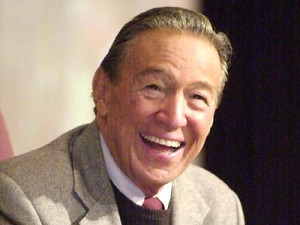Newsman Mike Wallace dies at 93
Mike Wallace (who spent four decades as a hard-hitting) provocative news correspondent on “60 Minutes,” has died, CBS reported Sunday. He was 93.
Wallace died Saturday night “peacefully surrounded by family members at Waveny Care Center in New Caanan, Connecticut, where he spent the past few years” – CBS said in a statement.
“For half a century, he took on corrupt politicians, scam artists and bureaucratic bumblers” – CBS News said on its website. “… Wallace took to heart the old reporter’s pledge to comfort the afflicted and afflict the comfortable. He characterized himself as ‘nosy and insistent.’”
During Sunday’s night episode of “60 Minutes,” Morley Safer called Wallace “a one-man truth squad with a remarkable gift for getting to the very core of a story.”
“More than anyone else, he was responsible for the continuing success of ’60 Minutes’” – Safer said. “We’re all in his debt.”
Hours earlier, Safer described his longtime colleague to CNN as someone who was “never dull,” “fearless” and “tenacious,” driven to get a scoop and to the heart of events, issues and people that shaped the world.
“Mike was irrepressible. You could never … knock him down, he would bounce right back up” – said Safer, expressing a deep admiration for a man whom he’d often jostle against for stories. “The fact is he was nosier than everybody else and more insistent, and more successful at being nosy.”
The death of CBS News’ pit-bull reporter Mike Wallace marks not only the passing of a broadcast lion but in many ways also the brand of journalism he helped to define.
Wallace (93) died late Saturday at a care center in New Canaan, Conn., where he had been staying for the last few years. CBS plans an hourlong tribute to Wallace and his career on “60 Minutes” next Sunday.
In announcing his death, CBS lauded the brazen tactics that it said had made Wallace a household name “synonymous with the tough interview — a style he practically invented for television more than half a century ago.”
“All of us at CBS News and particularly at ’60 Minutes’ owe so much to Mike” – Jeff Fager, chairman of CBS News and a longtime executive producer of “60 Minutes,” said in a statement released Sunday.
“Without him and his iconic style, there probably wouldn’t be a ’60 Minutes.’ There simply hasn’t been another broadcast journalist with that much talent. It almost didn’t matter what stories he was covering, you just wanted to hear what he would ask next.”
Wallace’s most memorable interviews often made headlines and stirred controversy.
“Mike Wallace is here to see you.”
The “60 Minutes” newsman had such a fearsome reputation that it was often said that those were the most dreaded words in the English language, capable of reducing an interview subject to a shaking, sweating mess.
Wallace (who died Saturday in the New Canaan, Conn.) care facility at age 93, didn’t just interview people. He interrogated them. He cross-examined them. Sometimes he eviscerated them pitilessly. His weapons were many: thorough research, a cocked eyebrow, a skeptical “Come on” and a question so direct it took your breath away.
Despite his tough style, the famous and infamous lined up to be grilled – Iranian revolutionary Ayatollah Khomeini, China’s Deng Xiaoping, Panamanian dictator Manuel Noriega, Israeli Prime Minister Menachem Begin and Libyan strongman Moammar Gadhafi.
Add to those seven U.S presidents and a host of celebrities, including baseball great Roger Clemens, who denied allegations of steroid abuse and Barbra Streisand about her many years of psychoanalysis – “What is she trying to find out that takes 20 years?” he asked.
“Many people who weathered a Mike Wallace interview grew to respect him greatly” – Fox News Channel Chairman Roger Ailes said on Sunday. “He actually was trying to serve the audience, and that’s what made him great.”
“He was hands down the best television interviewer ever” – said Steve Kroft, his former “60 Minutes” colleague. “I can’t think of anyone, besides [CBS legend Edward R.] Murrow, who had a greater influence in shaping television journalism.”
Wallace, who suffered from heart problems, seemed to lose his illustrious career in the fog of memory in his final few years. In a December 2011 interview with Playboy, Wallace’s son Chris, a Fox News anchor, said his father still recognized him but never talked about 60 Minutes.
“There’s a lesson there. This is a man who had a fabulous career and for whom work always came first. Now he can’t even remember it.”
